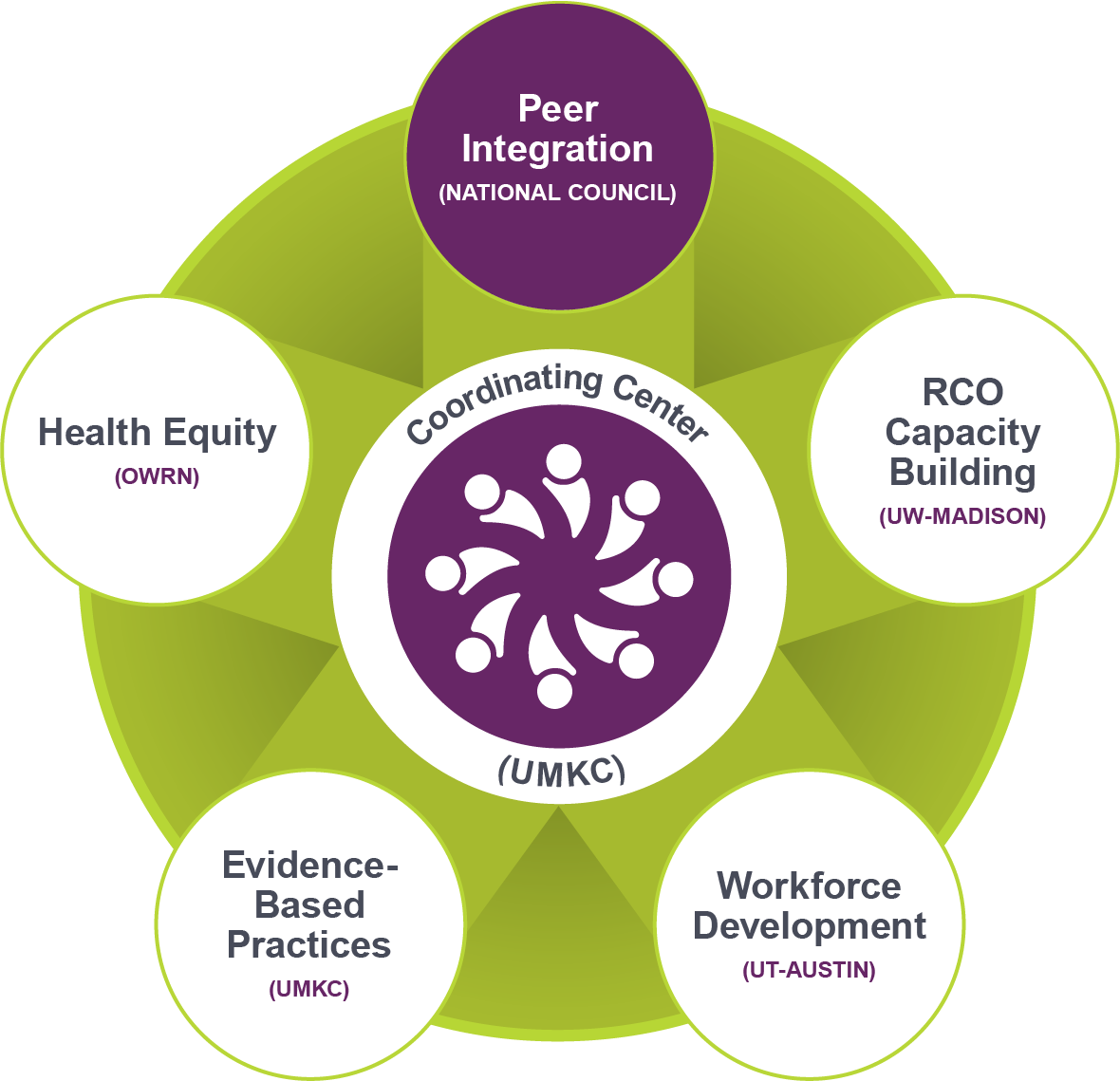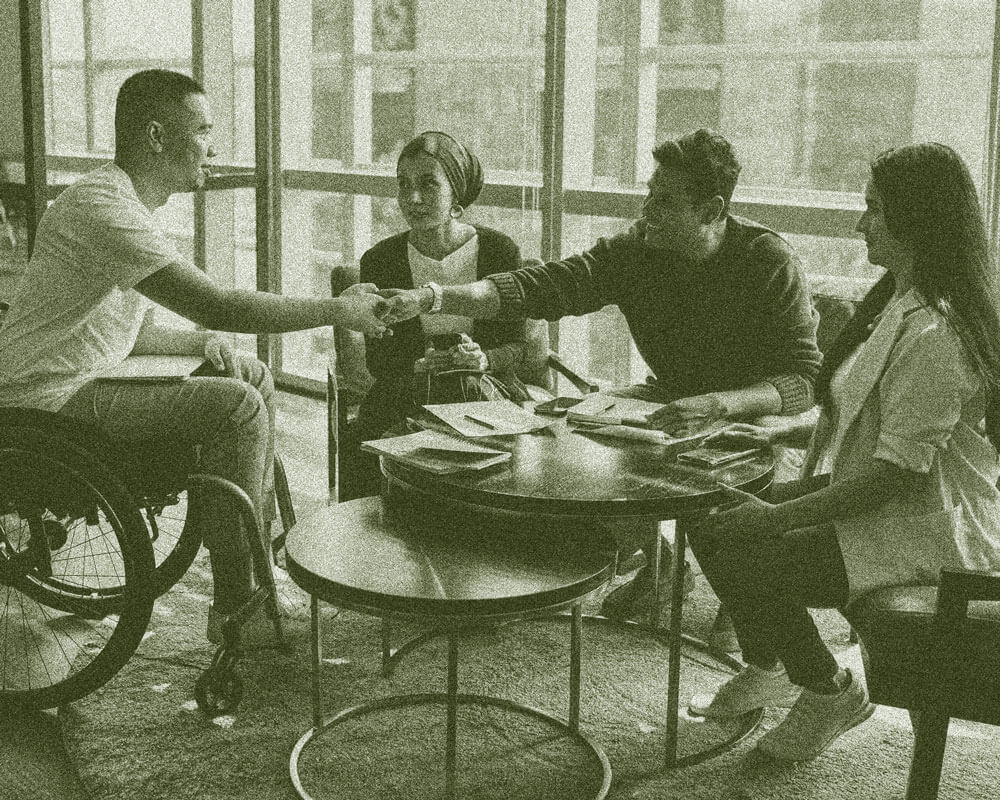The Peer Recovery Center of Excellence (PR CoE) is focused on supporting the integration of peer recovery support services (PRSS) into new and expanding settings. One of the goals of the PR CoE is to increase the number of non-traditional settings that incorporate PRSS into their existing programs.
Additionally, we want to enhance the integration of PRSS in “traditional” settings such as Recovery Community Organizations (RCOs) and treatment settings, including improving the integration process as a whole. We do this work by hosting trainings, creating and disseminating resources, and providing technical assistance (TA) around integrating peers into organizations and communities.
As the recovery movement grows, so does the field of peer recovery support services. We are seeing more and more the positive impact peer work can have in helping someone navigate, establish, and embody their recovery. Historically, PRSS have been made available in settings that often have barriers to access for the folks we want to serve. As the need for more peer recovery support services grew, we saw peers thrown into workplaces without much thought and care into the integration process. People need recovery, and PRSS helps sustain recovery, so we need more PRSS programming. This is why the Peer Integration focus area exists –we want to help grow the number of settings that offer PRSS, increase access to PRSS, and help organizations integrate peers well.

Organizations establishing new PRSS programs should have a clear idea of their expectations for their peer support workers before beginning the recruitment process, along with a plan for supervision, retention, and their professional development. There are many resources that outline strategies for successfully integrating PRSS into organizations. One of the gaps we identified in reviewing existing tools was organizational readiness for onboarding and supporting their peer workers. That is why we are working on a toolkit to address this. It will be a collection of evidence-based resources that support the successful adoption and/or expansion of PRSS.
In addition to tools and ongoing trainings, we also offer tailored TA to anyone who is interested in adopting PRSS into their organization. We have assisted folks in the following setting types integrate PRSS onto their teams:

“Regardless of their specific role, we have found that peer support staff can also vastly enhance organizational culture, adding a crucial element that complements but in no circumstances replaces clinical care: the element of hope. Through their lived experience, peer staff are a constant reminder that recovery is real and possible, regardless of one’s circumstances and the limitations imposed by one’s behavioral health condition.
Importantly, peer support staff also address two key issues that have long-hounded the behavioral health community: (1) the need to attract individuals to treatment and services well before their behavioral health conditions exact painful tolls on individuals, families, and communities, and (2) the need to move beyond treatment settings and support individuals in the communities in which they live, work, and play. The past decade has also taught us that peer staff must be more than merely present in an organization; in order to maximize their impact, they must become a fully integrated part of the service team and play an integral role in service planning and delivery as well as in organizational leadership.”
Dr. Arthur C. Evans, Jr., PhD, Philadelphia Dept. of Behavioral Health and Intellectual Disabilities Services and Achara Consulting Inc. (2017). Peer Support Toolkit. Philadelphia, PA: DBHIDS.
Martha Barbone, CPS and guest author for the National Council for Mental Wellbeing, outlines the vital nature of those with lived experience as we continue to respond to the pandemic.
In 2021, we received supplemental funding from SAMHSA to provide training and technical assistance (TA) to their Minority AIDS Initiative (MAI) grantees to integrate PRSS into their HIV prevention and treatment approaches. We provided proactive training and tailored TA to grantees to support this work. Even though the project period has come to an end, we continue to host trainings, create and disseminate resources, and provide technical assistance (TA) around integrating peers into organizations and communities, including HIV programming.
Substance use and use disorders are risk factors for HIV transmission and are more common among people living with HIV. Both service fields – substance use disorders and HIV – utilize peer service delivery models; integrating peer recovery support services (PRSS) into HIV programming can assist those with both illnesses. Little is known about how to best combine these two services.
Early in the project, we conducted a needs assessment to gather information from a subset of SAMHSA Minority AIDS Initiative (MAI) grantees about perspectives regarding integrating PRSS into their existing HIV programming, which will soon be published and available. We also hosted a number of trainings, whose recordings and slides are available on our previous events page. Using the needs assessment and feedback from trainings, we are working on a toolkit to support peer integration into HIV prevention and treatment settings.
Report
The Peer Recovery CoE is pleased to share Building and Strengthening the Capacity of Recovery Community Organizations: Results of a Needs Assessment Across U.S. RCOs. The purpose of this multi-modal needs assessment of RCOs within the 10 HHS regions was to determine strengths and challenges across RCO setting types in order to guide the future endeavors of the PR CoE, specifically through the provision of learning collaboratives and technical assistance. Through the utilization of digital surveys, regional stakeholder interviews and regional listening sessions, we were able to identify gaps in services and RCO resources, as well as an informed prioritization of future trainings and assistance offerings. This information will not only serve as guidance for the PR CoE, but is also available for those serving in any capacity with an RCO who might be seeking direction in allocating resources, financial or otherwise. We know that recovery is possible. And this hope inspires us to believe in the power of the collective. Together, we can work toward building and strengthening the capacity of Recovery Community Organizations.
Curriculum or Toolkit
Recovery Friendly Workplace Toolkit
The Peer Recovery CoE is pleased to share our Recovery Friendly Workplace Toolkit. We believe that employers play a critical role in fighting the disease of addiction. We want to make it easier for you to understand better how to create and maintain recovery friendly practices in your company. In this toolkit, we introduce substance use disorder, its impact in the workplace, and how to develop and support a Recovery Friendly Workplace. The goal of this toolkit is to provide you with practical tools and information. Too often, we ignore problems and do not provide resources to help people take action. Learn how being a Recovery Friendly Workplace can also benefit your company.
Curriculum or Toolkit
From Philadelphia's Department of Behavioral Health and Intellectual disAbility Services (DBHIDS), this report celebrates the powerful contribution made by peer support staff and people in recovery each and every day by providing a summary and analysis of the results of and recommendations from the 2015 peer support asset-mapping process and by identifying next steps in our commitment to long-term recovery and the central role of peer culture, support and leadership.
Curriculum or Toolkit
A Guide To Best Practices In LGBTQIA+ Cultural Competency Training
This toolkit presents recommended standards and best practices for training health care providers and staff in lesbian, gay, bisexual, transgender, queer, intersex, and asexual/ace spectrum (A) cultural competence. It reflects the expert consensus of leading educators, providers, academicians, researchers, and patient advocates, developed over the past two years, through two in-person summits held at Whitman-Walker Health in Washington, DC, and through consultations with health care centers and other experts across the U.S.
Curriculum or Toolkit
Addiction Recovery Support Services and Information
Recovery support services are intended to provide access to social support, employment, housing, and a variety of other services for people in recovery from substance use disorder. The major types of recovery support services are information featured below are covered in the above document.
Curriculum or Toolkit
Addressing Opioid Use Disorder among LGBTQ Populations
Opioid use disorder has reached an alarming rate in the United States. As a population disproportionately affected by substance use disorders (SUDs), the lesbian, gay, bisexual, transgender and queer (LGBTQ) community has not been spared from the opioid epidemic. According to the 2015 National Survey on Drug Use and Health, LGB men and women across all age brackets were significantly more likely to have misused prescription pain relievers in the last year compared to heterosexual adults (Figure 1), and had almost three times greater risk of opioid use disorder compared to heterosexual adults.1 Although little is known about opioid use among transgender people, the few studies that do exist have found an elevated prevalence of illicit drug use in this population
NIATx Change Leader Academy & Improving Team Strengths Sessions
Nonprofit Basics: Strengthening Organizational Capacity
Each topic will have two consecutive sessions. In order to participate in the second session, attendance at the first is required.
The National Council for Mental Wellbeing (National Council) has more than 40 years of experience as a national thought leader advancing modern, research-based training, TA, and knowledge transfer activities on topics of behavioral health. The National Council has designed, implemented, and evaluated over 1,500 initiatives to improve behavioral health practice at local, state, and national levels. National Council has trained staff at numerous organizations in domains of mental health literacy and appropriate interventions to address behavioral health challenges.
Peer Service Integration
RCO Capacity Building
Funding for this initiative was made possible by grant no. 1H79TI083022 from SAMHSA. The views expressed in written conference materials or publications and by speakers and moderators do not necessarily reflect the official policies of the Department of Health and Human Services; nor does mention of trade names, commercial practices, or organizations imply endorsement by the U.S. Government.